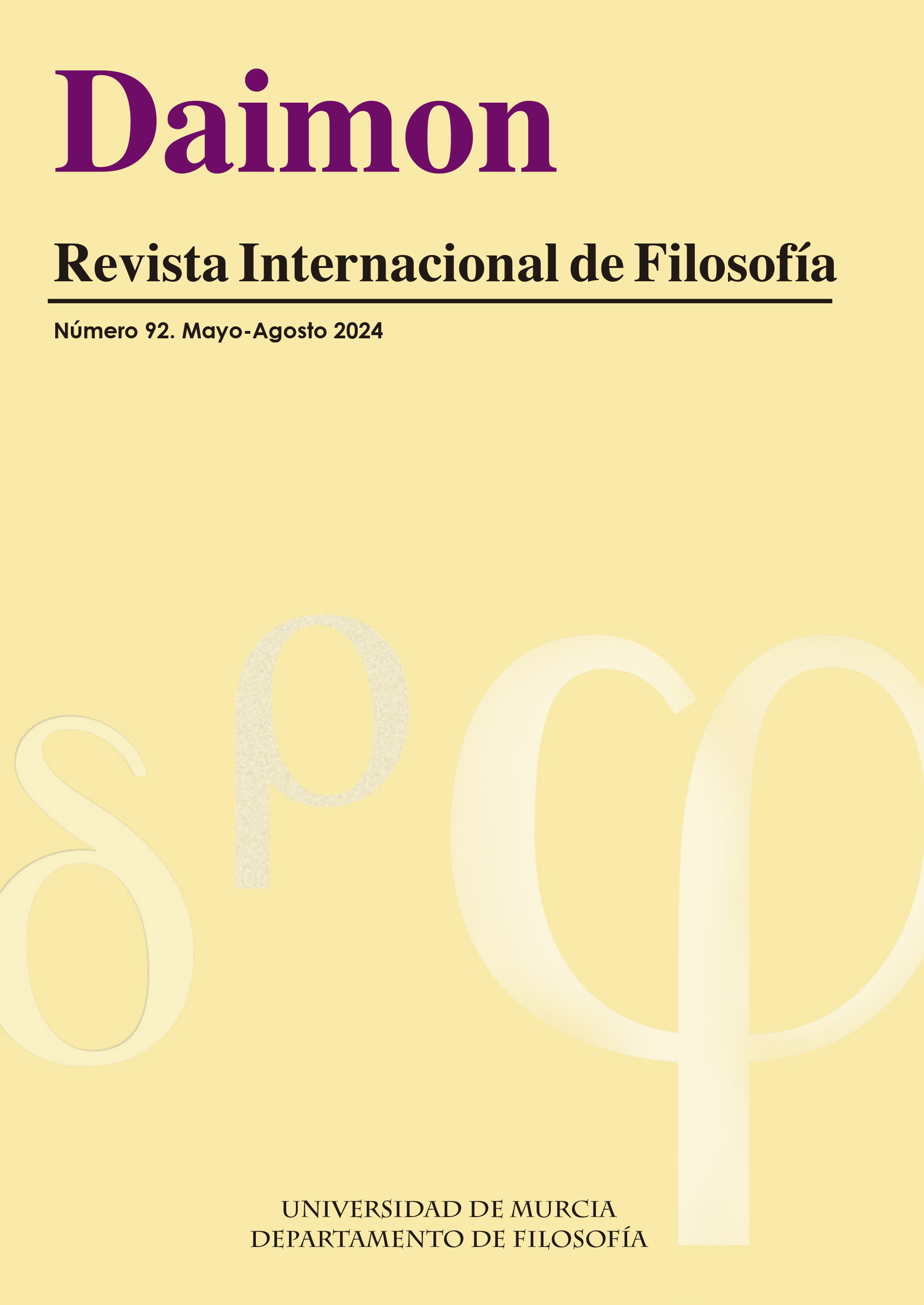From Violence to Love. On the problematic knot between subjectivity, affect and the political in the work of Toni Negri
Supporting Agencies
- Actualmente está disfrutando de una ayuda de recualificación otorgada por el Ministerio de Innovación en Alma Mater Studiorum de Bologna.
Abstract
This article reviews some of Toni Negri's texts in order to offer, despite the conceptual shifts present in his work, a vision of continuity. From Dominio e Sabottaggio to the more recent Empire, Multitude and Commonwealth, a common purpose can be traced in his work: namely, to imagine an organizational form that can account for the forces of living labor, as well as the definition of a new political grammar capable of facing the challenges of the contemporary world. This path is traced here through the analysis of the notions of violence and love as threads that bear witness to Negri's persistent attempt to return time and again to illuminate the problematic knot between diverse subjectivities, affects and the construction of the political.
Downloads
-
Abstract481
-
PDF (Español (España))286
-
HTML (Español (España))27
References
AAVV. (2009), Processo 7 Aprile. Padova trent’anni dopo. Voci della ‘cittá degna’. Roma: ManifestoLibri.
Asor Rosa, A. (2002), «Le due societá» en: Storia e Problemi Contemporanei. Rileggendo gli anni settanta, pp. 135-146.
Bianchi, S. (2011), Storia di una foto. Roma: DeriveApprodi.
Balestrini, N. (1997), «Cattivi Maestri» en: Bianchi, S. e Caminiti, L., Settantasette. La Rivoluzione che viene. Roma: DeriveApprodi, pp. 325-332.
Bocca, G. (1980), Il caso 7 Aprile. Toni Negri e la grande inquisizione. Milano: Feltrinelli.
Brown, N. & Szeman, I. (2005), «What is the Multitude? Questions for Micheal Hardt and Toni Negri», Cultural Studies, 19/3, pp. 372-387.
Callinicos, A. (2012), «Toni Negri in perspective», International Socialism Journal, 92/2, pp. 33–61.
Catanzaro, R. (1990), La política della violenza. Bologna: Il Mulino.
Crainz, G. (1996), Storia del miracolo italiano. Culture, identitá, trasformazioni fra anni cinquanta e sessanta. Roma: Donzelli.
Crainz, G. (2003), Il Paese mancato. Dal miracolo económico agli anni ottanta. Roma: Donzelli Editore.
Crainz, G. (2011), Autobiografia di una Republica. Le radici dell’Italia attuale. Roma: Donzelli.
DeWiel, B. (2014) «Two Concepts of Violence in Hardt and Negri’s Empire Trilogy» en: Chakrabarti, P., De Carli, N. and Patricio, J., Violence in the Contemporary World: An Interdisciplinary Approach. Oxford: Inter-Disciplinary Press, pp. 131-139.
Galli, G. (2004), Piombo Rosso. La storia completa della lotta armata in Italia dal 1970 ad oggi. Milano: Baldini Castoldi Dalai.
History Channel: L’ Eterna Rivolta’: https://www.youtube.com/watch?v=F56VAFsZUp8. Consultado el 28/09/2021.
Hardt M. (2011), «For Love or Money», Cultural Anthropology, 26, pp. 676-682.
Hardt, M. (2007), About Love Video-conference. Consultado online: https://www.youtube.com/watch?v=JTTz8AZzLkM. Consultado el 21/07/2021.
Hardt, M. (1994), «Toni Negri’s practical philosophy» en: Ryan, M. (Ed), Body Politics. Disease, Desire, and the Family. San Francisco: Westview Press.
Macdonald, B.J. (2003), «Thinking through Marx: An introduction to the political theory of Antonio Negri», Strategies: Journal of Theory, Culture & Politics 16/ 2, pp. 86–95.
Mezzadra, S. (2014), La cocina de Marx. El sujeto y su producción. Buenos Aires: Tinta Limón.
Montefusco, W. e Mimmo Sersante (2016), Dall’operaio sociale alla moltitudine. Roma: DeriveApprodi, ‘Intermezzo’, Intervista a Toni Negri.
Negri, T. and Michael Hardt (2000), Empire. London: Harvard University Press.
Negri, T. and Michael Hardt (2004), Multitude. War and Democracy in the Age of the Empire. New York: Penguin Press.
Negri, T. and Michael Hardt (2006), «Dominio e Sabotaggio» en: Negri, T., I libri del rogo. Roma: DeriveApprodi.
Negri, T. and Michael Hardt (2006), <> en: Negri, T., I libri del rogo. Roma: DeriveApprodi.
Negri, T. and Michael Hardt (2006), Movimenti nell’Impero. Passaggi e paesaggi. Milano: Raffaello Cortina Editore.
Negri, T. and Michael Hardt (2012), Spinoza e noi. Milano: Mimesis.
Negri, T. and Michael Hardt (2015), Storia di un comunista. Milano: Ponte delle Grazie.
Negri, T. and Michael Hardt (2017), Galera e Esilio. Storia di un comunista. Milano: Ponte delle Grazie.
Negri, T. and Michael Hardt (2020), Da Genova a Domani. Milano: Ponte della Grazie.
Moroni, P. (1997), «Un’altra via per le Indie. Intorno alle pratiche e alle culture del ‘77» en: Bianchi, S. e Caminiti, L., Settantasette. La Rivoluzione che viene. Roma: DeriveApprodi, pp. 68-81.
Zavoli, S. (1989) Video-intervista Rai: https://www.youtube.com/watch?v=GmyBbbkIY3Y. Consulta online 22/07/2021.
Copyright (c) 2024 Daimon Revista Internacional de Filosofia

This work is licensed under a Creative Commons Attribution-NonCommercial-NoDerivatives 3.0 Unported License.
Las obras que se publican en esta revista están sujetas a los siguientes términos:
1. El Servicio de Publicaciones de la Universidad de Murcia (la editorial) conserva los derechos patrimoniales (copyright) de las obras publicadas, y favorece y permite la reutilización de las mismas bajo la licencia de uso indicada en el punto 2.
2. Las obras se publican en la edición electrónica de la revista bajo una licencia Creative Commons Reconocimiento-NoComercial-SinObraDerivada 3.0 España (texto legal). Se pueden copiar, usar, difundir, transmitir y exponer públicamente, siempre que: i) se cite la autoría y la fuente original de su publicación (revista, editorial y URL de la obra); ii) no se usen para fines comerciales; iii) si remezcla, transforma o crea a partir del material, no podrá distribuir el material modificado.
3. Condiciones de auto-archivo. Se permite y se anima a los autores a difundir electrónicamente las versiones pre-print (versión antes de ser evaluada) y/o post-print (versión evaluada y aceptada para su publicación) de sus obras antes de su publicación, ya que favorece su circulación y difusión más temprana y con ello un posible aumento en su citación y alcance entre la comunidad académica. Color RoMEO: verde.











